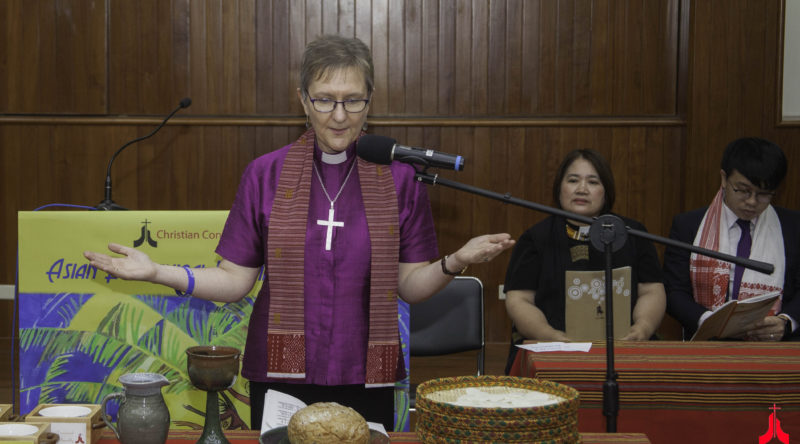Ecumenical Women’s Assembly concludes with calls for Asian women to be advocates and catalysts of reconciliation, renewal and restoration
 Holy Eucharistic Service at the closing of AEWA led by Bishop Genieve Blackwell from Australia.
Holy Eucharistic Service at the closing of AEWA led by Bishop Genieve Blackwell from Australia.
HSINCHU, Taiwan: The week-long Asian Ecumenical Women’s Assembly (AEWA) concluded with calls for action to empower women as advocates and catalysts to ensure reconciliation, renewal and restoration in the world, communities, and churches.
Organized and facilitated by the Christian Conference of Asia (CCA) the, AEWA ended with an ecumenical Holy Eucharistic Service led by Bishop Genieve Blackwell of the Anglican Church of Australia with the assistance of a group of intergenerational women representatives from various churches across Asia.
In a communique issued at the end of the AEWA, participants affirmed “At this critical time of our history, when the whole of God’s creation is groaning due to irresponsible human action, greed and continuing discrimination, violence and exploitation of women and children, without repenting from the sin of greed, and without reconciling and doing justice to God’s creation, women and the marginalized communities in particular, the world will not experience justice and peace.”
“We are with one voice in asserting NO to a culture of violence and exploitation of earth’s resources. We affirm that we need to stand together in solidarity towards realizing justice and peace at this Kairos moment of our planet earth”, the participants declared towards the end of the AEWA.
The participants expressed appreciation for the space AEWA provided them to “recommit to God and affirm that the nurturing and sustaining roles of women are crucial, and our voices must be heard for the liberation of the whole earth”.
The homily at the closing worship was delivered by the Vice Moderator of the Presbyterian Church in Taiwan (PCT), Rev Abus Takisvilainan.
Rev Abus encouraged participants to have perseverance and renewed faith in God in pursuit of their tasks and goals.
She also commented the CCA for bringing together a diverse group of intergenerational women to discuss the pressing concerns of the time. The first woman Vice Moderator of the PCT in its 154 years of history, Rev. Abus encouraged the participants to learn about the differences among people to respect and celebrate their diversities, but never to rebuke or discriminate against them.
The need to work tirelessly for the realization of a better world for women and men and the whole of creation was echoed in the comments shared by the participants in the closing session.
Participants shared reflections on their time in the Assembly and the many insights that they take back with them to their local contexts.
In the fifth panel presentation held earlier in the morning focusing on the theme ‘Towards Ensuring an Inclusive Leadership in Church and Society, examples and experiences of women in leadership from different Asian contexts were shared.
Dr Eun Ha Kim from Korea took the participants through the history of Asian women’s participation in the ecumenical movement and called for new strategies for women leadership to emerge in church and society.
Rev Romella Robinson from Pakistan shared a moving testimony on the many challenges of Christian women in her country.
Rev Romella shared the experiences of her own denomination and said, although women are ordained, they are asked to ‘stay silent as much as possible’, and their gifts are limited to volunteer work. In most churches, women ministers are not permitted to administer the Holy Sacraments.
Wellorich Anderson Sokhlet from India said that much progress had been made in the context of increased women’s participation in her church. However, she noted that it was always male leadership that had the final say, even if women were ‘empowered’ to make decisions. Despite her community following matriliny, she said that patriarchal customs had crept into church practice.
Wellorich’s church has seen the decades-long struggle for the ordination of women, and she hopes to see this change in the near future. “As women,” she said, “We must voice out our support for each other, and not criticize and bring down anyone. We must seek first the kingdom of God - righteousness and inclusivity will then follow.”
The AEWA hosted by the Presbyterian Church in Taiwan and held in Hsinchu City, Taiwan from 21 to 27 November 2019 was attended by more than 250 women.










